If you’re looking to contact reporters, reporters, or other media contacts in hopes of getting media coverage, you have to know how to:
- Find relevant journalists that could be interested in covering a story like yours
- Find their email address or other ways to get in touch
Of course, you also have to make sure you have a story that’s worth writing about and know how to write a compelling media pitch, but since you’re about to find relevant media contacts for your pitch, you probably know this already.
In this guide, you’ll find the best tools & methods to find journalists and their contact information in order to create a press email list and pitch them your story.
Sign up for Prowly’s 7-day free trial and find relevant journalists with unlimited search access. Access over 1 million contacts in the media database that you can filter by keyword, topic, location, and more.
How to find relevant journalists and media contacts
The first step is to identify journalists and reporters that cover your topic of interest. These can be people who write about your specific industry or a particular location—such as your city.
Here are 4 tested methods of finding journalists:
1. Using a media database to find journalists and outlets
A media database is a directory of various national or international media contacts that you can filter by beat, location, outlet, etc.
They are not only limited to journalists but can contain bloggers and other digital influencers as well—people who can also get you media coverage.
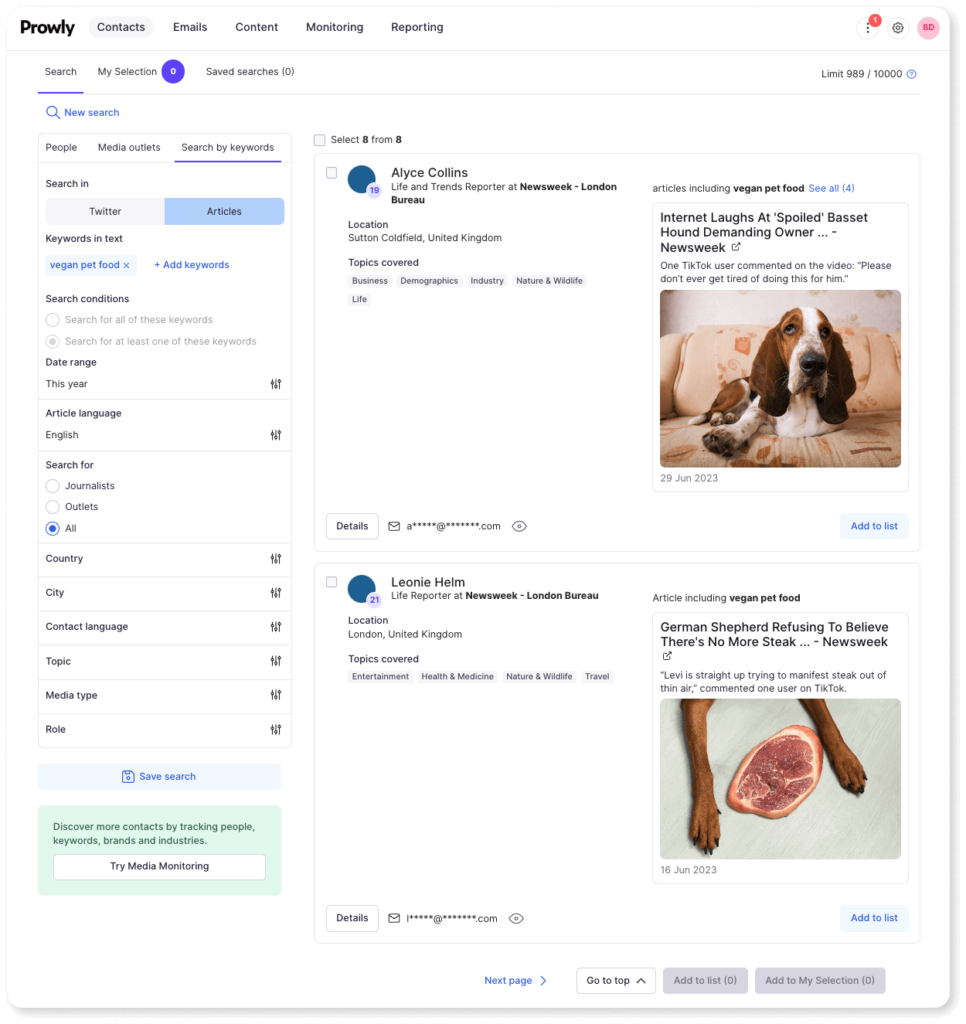
Media databases like Prowly, Press Hunt, or Anewstip are very useful in their own right but become an even more effective solution when paired with supplementary googling.
With a quick search, a tool like Prowly can give you a list of thousands of journalists, reporters, and media outlets of all types—AND their contact details.
Nowadays, many databases will allow you to search for media contacts by keywords in their Tweets or articles, allowing you to quickly find the most relevant people and see what they’ve recently written about.
To do this in a tool like Prowly, simply navigate to the media database and select “Search by keywords”, choose “Articles” and enter the keywords you want to search for.
For the sake of example, let’s pretend we are looking for journalists that cover “vegan pet food”.
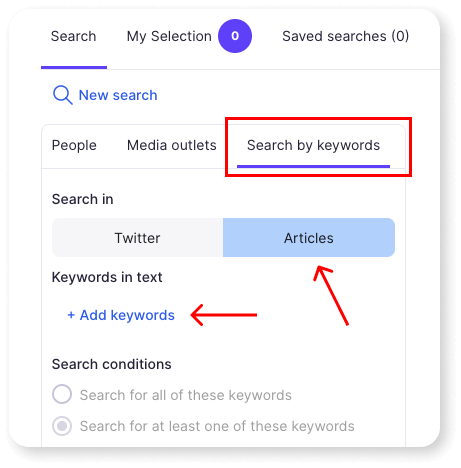
Narrow down your search using filters, such as date range, location, or more advanced filters.
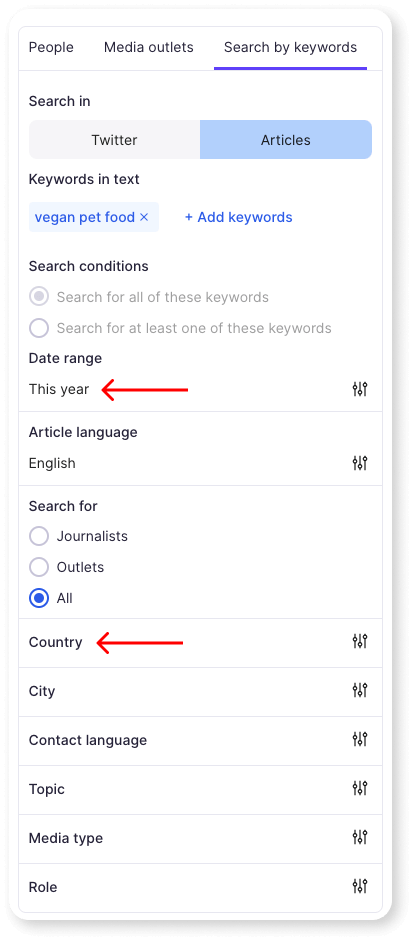
Once you’ve selected your keywords and filters you’ll get a list of journalists with articles matching your search query.
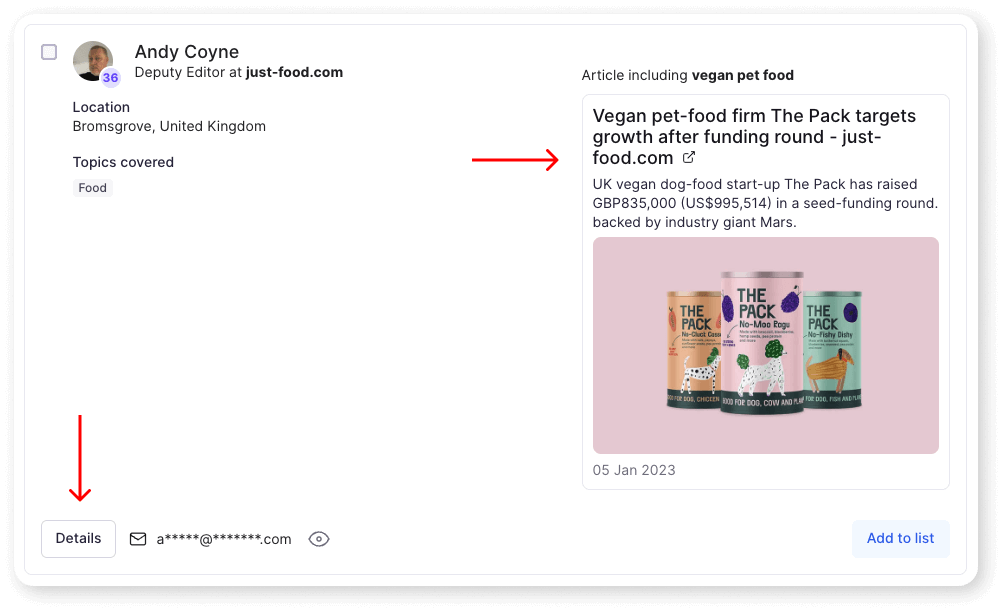
Next, inspect the media contacts you deem to be a good fit for more information. You’ll find many useful details such as:
- Their recent articles, to see what other topics they write about
- Their contact information, to get in touch
- Their social media profiles, to find out more about them
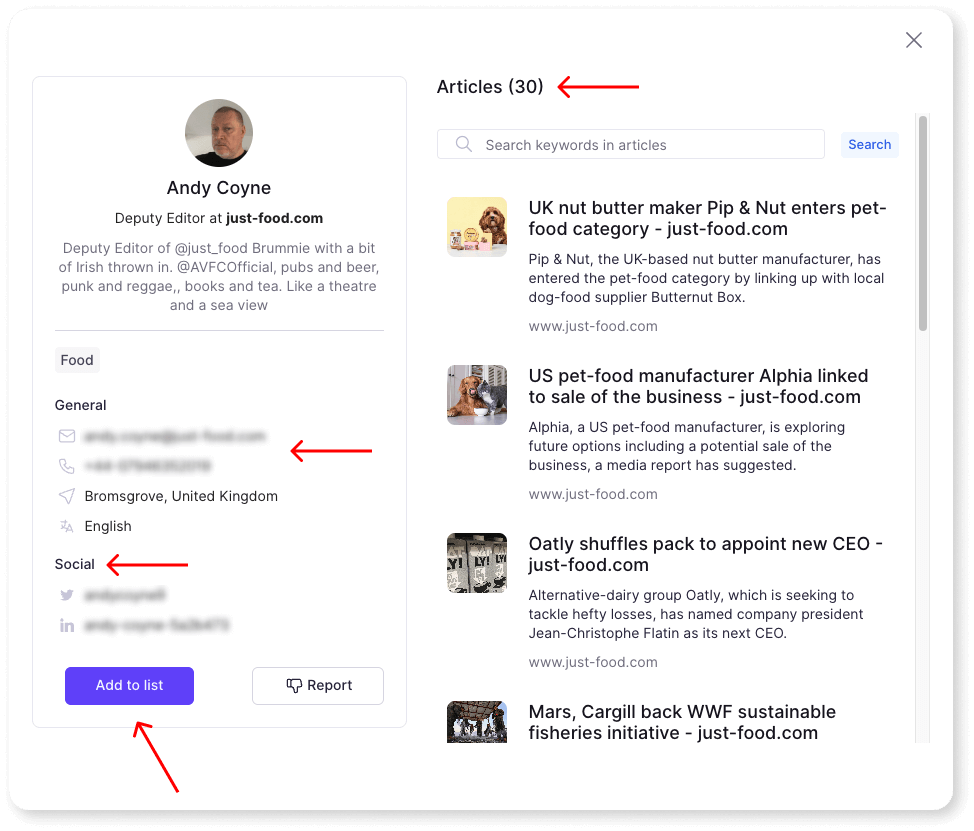
If you want to do additional research, you can dig deeper by using Twitter or Google to find out additional details about the reporters you found.
- What kind of topics are they currently writing about?
- What are they interested in?
- Are they looking for a story like yours?
With Prowly, you can not only access a database with over a million contacts but also use smart recommendations based on the contents of your press releases. This way, you can find relevant journalists that are likely to be interested in your story.
2. Finding journalists on social media
Most reporters are on social media especially Twitter and Linkedin. These two platforms provide a free, but somewhat more time-consuming method of finding press contacts.
Take advantage of the search function on these sites, and search for “[keyword] editor” or “[keyword] journalist”. Replace [keyword] with the topic, location or media outlet that you have in mind.
Janet Murray, PR & content expert, recommends:
It’s also a good idea to create a Twitter list of journalists on your target publications and check-in daily to see what they’re talking about.
Not only will you get a feel for the kind of stories they’re interested in (you might even spot requests for help with stories they’re working on), you can also start building a relationship by replying to their tweets and/or sharing their content.
However, keep in mind that many journalists moved from Twitter to its alternatives since the (in)famous acquisition by Elon Musk.
3. Using Google News to find media outlets
Google News is a good and free tool to find media outlets (and then find the appropriate journalists) in your niche.
How to use it:
Enter the names of your keywords, competitors, or businesses similar to yours.
You’ll get a list of outlets, blogs, news sites, etc. where they were already featured—publications where you have a shot at getting coverage.
Write down the publications, editors/journalists, and any other useful information.
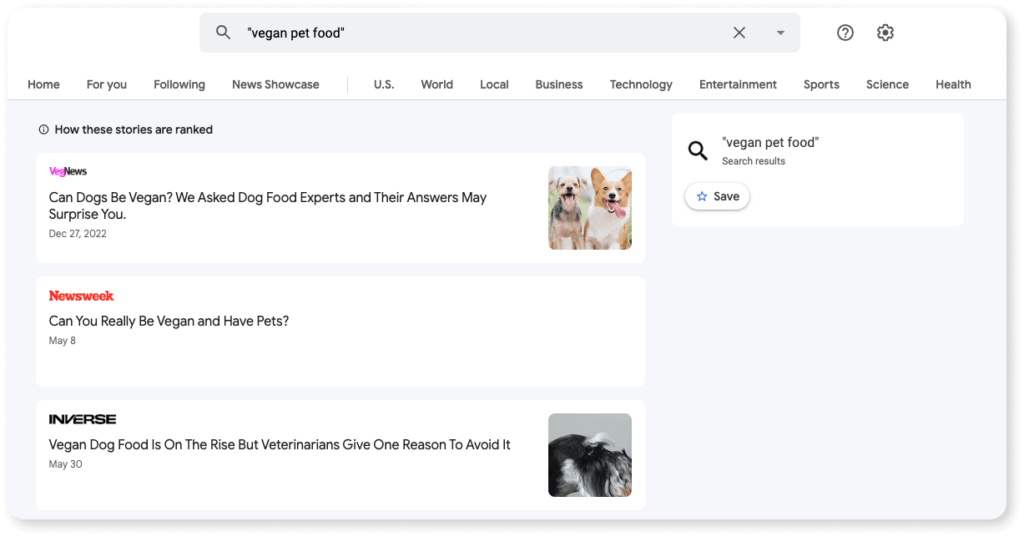
4. Leveraging backlink checkers and other SEO tools
A more advanced version of this method involves using backlink checkers like Semrush. A backlink for a given web resource (usually a website) is an incoming link from another webpage.
In other words, if you enter the domain of a website (for example, your competitor), you can find a list of all websites that link to it, and from which specific page.
Some of these backlinks could be from blogs and news sites that are relevant to your business, and allow you to find relevant journalists from those publications.
How to use it:
Enter the domain of a competitor or website related to yours. Let’s continue with the website of a vegan pet food producer, as an example.

Next, analyze the list of backlinks. Keep an eye out for any relevant publications such as news sites or blogs.
In the example below, you can see that one of the results is a relevant article from The Telegraph, a newspaper from the UK.

Continue to the article, and look for the name of the author. Most websites will show you other articles they’ve written, and include a short bio—which can be useful for determining if that person is a good fit.
How to find journalists’ email addresses or contact information
Once you have a tailored list of journalists & reporters who could be interested in your story, the next step is to find their contact details, such as their email, phone number, or social media accounts.
Here are 4 proven ways of finding a journalist’s email address:
1. Checking in a media database
A journalist database is an easy and straightforward way of finding journalists’ emails and other contact details.
If you’ve already found people through the database, then there’s nothing that you need to do! Their contact information will already be visible in your saved contacts or lists.
However, you can also use a database to find the emails of journalists you gathered from other sources, such as social media or publications.
How to use it:
If you’re using a database like Prowly, simply enter your media contacts into the search box.
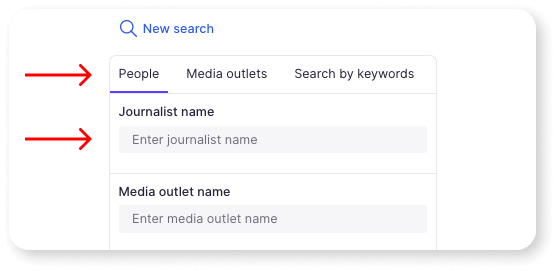
If they’re in the database, you’ll find the journalist’s email address(es), phone number, and social media accounts (depending on the platform).
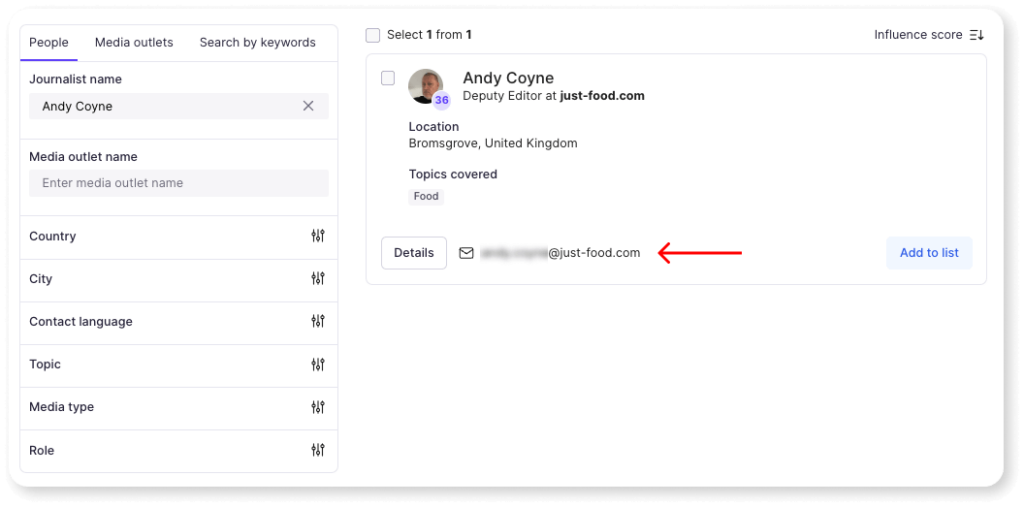
Some databases also provide additional useful information such as their recent Tweets or written articles.

2. Using email finder tools
Email finder tools are a simple and quick way to find a journalist’s email address—although not as accurate as a media database.
An example of a free tool is Hunter.
Hunter describes their tool as:
All you need to connect with any professional. It puts all our data together—email formats, email addresses found on the web, verifications, and other signals—to find the right contact information in half a second.
It’s free for up to 25 searches per month.

Other tools include Anymailfinder, Uplead and Voilanorbert.
3. Checking on the website of the media outlet or giving them a call
If you know the name of the media outlet the reporter works for (or you just want to find journalists working for that outlet), try checking on the website of the outlet.
At the very least, there should be a general email or phone number; send an email or give them a call and explain you’re trying to reach this particular journalist/editor.
4. Looking them up on social media
Some journalists will include their email addresses on their social media profiles. If not, you can try messaging them directly through the platforms and asking there.
If I am unable to find the contact I need within a media database, then I go right to the journalist’s social media pages to verify their current job position, and sometimes their email address will be posted too. Next, I call the main number of the media outlet and ask the receptionist for the correct phone number or email address of the person I am hoping to contact.
If I still don’t end up with the information that I need, then I connect with the journalist on social media and send them a private message introducing myself and requesting their contact info. I have personally tried all of these free methods and can attest to the fact that they work. – Catherine Kennedy, a freelance publicist with 15 years of experience in the PR industry
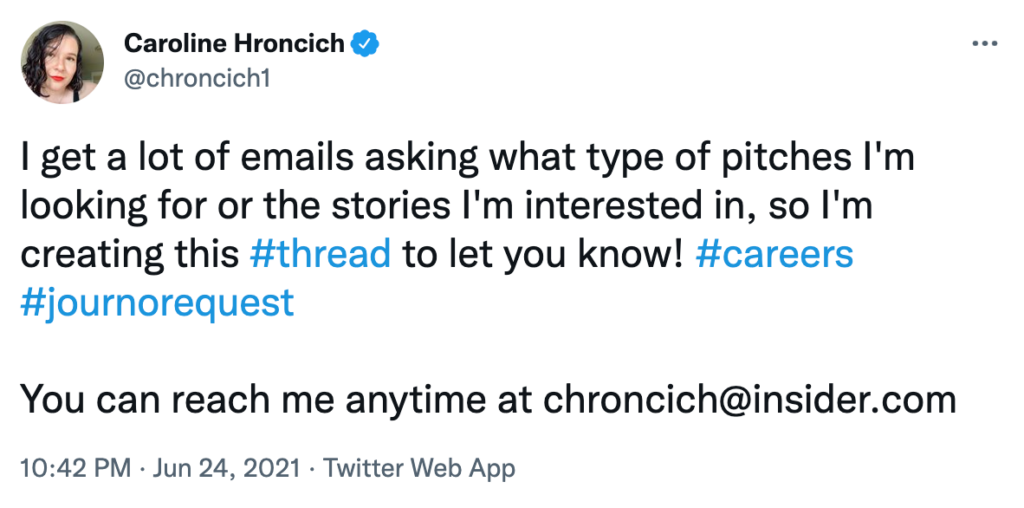
How to contact journalists
Once you’ve found the right journalists and their contact details, the final step is to get in touch with them.
Contacting journalists in order to get press coverage—also known as pitching journalists—can be done through many different mediums.
Most commonly this is done through email, but you can also contact journalists on social media platforms, over the phone, or in person, for example at conferences.
💡 Protip: Journalists usually have their preferred method of being contacted. If you can this information, use it to your advantage.
Remember—journalists receive a ton of pitches and press releases every day, and having a unique story and angle is crucial to help them quickly understand why they should be interested in your story.
How to contact journalists:
- Make sure the news you’re pitching is actually newsworthy
- Find an interesting news angle
- If possible, find out a journalist’s preferred method of being contacted
- Get their attention and offer value in your pitch
- Follow up if needed
Read more: How to Write a Media Pitch (7 Real Examples from Experts)
Conclusion
Contacting the right reporters, journalists, and other media contacts for your story is crucial for getting media coverage. Knowing how to find them—and their contact information—swiftly and effectively will make your job a lot easier.
Take advantage of the free tools & methods listed above or get free 7-day search access to Prowly’s Media Database to see if it’s a fit for your business.
Cover photo by Brett Jordan

